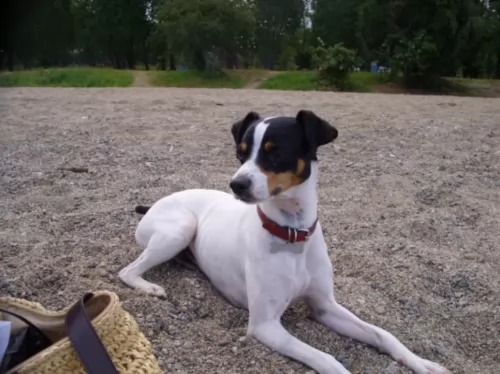 Petzlover
Petzlover Alopekis is originated from Greece but Chilean Fox Terrier is originated from Chile. Alopekis may grow 8 cm / 3 inches shorter than Chilean Fox Terrier. Alopekis may weigh 21 kg / 47 pounds more than Chilean Fox Terrier. Both Alopekis and Chilean Fox Terrier has almost same life span. Both Alopekis and Chilean Fox Terrier has same litter size. Alopekis requires Moderate Maintenance. But Chilean Fox Terrier requires Low Maintenance
Alopekis is originated from Greece but Chilean Fox Terrier is originated from Chile. Alopekis may grow 8 cm / 3 inches shorter than Chilean Fox Terrier. Alopekis may weigh 21 kg / 47 pounds more than Chilean Fox Terrier. Both Alopekis and Chilean Fox Terrier has almost same life span. Both Alopekis and Chilean Fox Terrier has same litter size. Alopekis requires Moderate Maintenance. But Chilean Fox Terrier requires Low Maintenance
 The courageous Alopekis is said to have run with and fought with bulls. To this day they escort bulls in Greece. They were used by the Greeks to contain the vermin populations, guard the chickens and ducks, and assist larger dogs in working with sheep. At one time it was thought that they originated from breeding of dogs and foxes, but this proved not to be true. It was also once considered to be the same breed as the Small Greek Domestic Dog, but it has since been declared its own breed.
The courageous Alopekis is said to have run with and fought with bulls. To this day they escort bulls in Greece. They were used by the Greeks to contain the vermin populations, guard the chickens and ducks, and assist larger dogs in working with sheep. At one time it was thought that they originated from breeding of dogs and foxes, but this proved not to be true. It was also once considered to be the same breed as the Small Greek Domestic Dog, but it has since been declared its own breed.
The Alopekis is not a recognized breed with any of the current national or international dog organizations. The Kennel Club of Greece will recognize them once their population is large enough. They cannot be recognized by the AKC, IKC, or International groups until they are a much larger group.
 The Chilean Fox Terrier, developed in Chile, is a dog breed which comes from crossing the British Fox Terrier with some of the local Chilean dogs.
The Chilean Fox Terrier, developed in Chile, is a dog breed which comes from crossing the British Fox Terrier with some of the local Chilean dogs.
The dog is thought to have been developed in the 19th century already, some time between 1790 and 1850.
The dog is known for its skills in catching rats and mice. Known also as the Chilean Rat Terrier, Terrier Chileno or Ratonero, the Chilean Fox Terrier hasn’t achieved formal recognition with any of the leading canine organizations.
 The Alopekis is a small, fox-like dog with pricked ears on a head that is wedge shaped. They have large eyes, a deep and tapered muzzle with a broad nose. They are short but have long backs and a deep, wide chest with strong legs and feet. They have a beautiful tail that cures upward and a double coat.
The Alopekis is a small, fox-like dog with pricked ears on a head that is wedge shaped. They have large eyes, a deep and tapered muzzle with a broad nose. They are short but have long backs and a deep, wide chest with strong legs and feet. They have a beautiful tail that cures upward and a double coat.
 The Chilean Fox Terrier looks almost identical to his ancestors. He stands between 30 – 40cm and weighs between 5 to 9kg.
The Chilean Fox Terrier looks almost identical to his ancestors. He stands between 30 – 40cm and weighs between 5 to 9kg.
He is squarely proportioned, he is athletic looking and well muscled with long, slender legs. Many of these dogs are born with naturally short tails, but if not, then the tail is usually docked after the first or second vertebrae. Now that docking is falling out of favor, the breed is losing that distinctive look.
The head of the Chilean Fox Terrier is triangular with the muzzle being somewhat shorter than the Smooth Fox Terrier. The ears of the Chilean Fox Terrier are smallish and high set, being partially erect. The coat of the dog is short and thick and essentially white while the face is usually tan and black.
The Chilean Fox Terrier is loyal with his human family and can fit in well with a family where there are children and other pets.
Training and socialization become necessary for the dog so that he becomes obedient and amicable around his family and with strangers. He isn’t an aggressive dog but he is alert and can make an excellent watch dog.
He is dominant and confident and also intelligent and easily trainable. He is an active dog so he will require exercise every day, whether he lives in the city or in the country.
 The Chilean Fox Terrier is a lively dog with an alert expression. He has become a popular companion dog, being less aggressive than other Terriers.
The Chilean Fox Terrier is a lively dog with an alert expression. He has become a popular companion dog, being less aggressive than other Terriers.
When you treat him well he becomes a loyal friend and forms a strong bond with his human owners. He gets on well with children who have been taught to respect animals, but he tends to become a bit aggressive around other dogs of the same sex.
Socialization and training however can make him much more relaxed around other dogs.
He is an attractive little dog with his short coat, giving the appearance of being well groomed. He can adapt to country- or city life too. He is such an easy dog to keep too so why not choose him as your 4-legged family member? He promises to make the perfect family companion.
 The Alopekis is an endangered species of canine due to a variety of factors. Traditionally this has been a healthy gene pool and the breed has been an example of the evolution of small canines. Factors such as farm pesticides, urbanization and cross breeding have affected the breed’s future.
The Alopekis is an endangered species of canine due to a variety of factors. Traditionally this has been a healthy gene pool and the breed has been an example of the evolution of small canines. Factors such as farm pesticides, urbanization and cross breeding have affected the breed’s future.
This is made worse by the fact that the female Alopekis only breeds once a year, the litters are small, and the puppy mortality is high. In addition, the dogs are regularly neutered as part of a program to control strays, despite their status as an endangered species.
 The Chilean Fox Terrier is a healthy breed who doesn’t appear to have any particular health issues. It doesn’t mean that your dog will be free from disease, but it is worth knowing that a quality diet, fresh water and lots of love and attention does enhance longevity in a pet.
The Chilean Fox Terrier is a healthy breed who doesn’t appear to have any particular health issues. It doesn’t mean that your dog will be free from disease, but it is worth knowing that a quality diet, fresh water and lots of love and attention does enhance longevity in a pet.
It is to your benefit to know about one or two common diseases that your dog could get.
You’ll notice your pet’s stomach being swollen. Bloat is a disease which can become dangerous because the stomach can twist. Once this happens, gas can’t escape from the stomach and your pet will want to vomit, he’ll salivate and you’ll notice unusual restless kind of behavior. You need to get him to the vet as soon as possible.
This is also a disease that any dog can develop and can be a complication of another pet disease such as Lyme disease. One of the first signs of kidney disease in dogs is drinking more often than usual and also urinating more often.
He’ll lose his appetite and be lethargic and likely lose weight. Kidney disease is a serious disease and you will need to get your pet to the vet as soon as possible.
 This is a high energy dog and the puppies need to be fed a high-quality puppy food. Feed about 1/3 of a cup twice a day.
This is a high energy dog and the puppies need to be fed a high-quality puppy food. Feed about 1/3 of a cup twice a day.
Feed high- quality dry dog food and dog treats to this active dog. Feed about ¼ of a cup twice a day – more if below average weight and less if overweight.
Keep them active and away from pesticides if possible.
This is a very active dog that needs a lot of exercise, games and if possible – a job.
 The Chilean Fox Terrier is a low maintenance breed and this means you won’t be having to part with any money on grooming sessions for him. He’ll basically require a brushing twice a week.
The Chilean Fox Terrier is a low maintenance breed and this means you won’t be having to part with any money on grooming sessions for him. He’ll basically require a brushing twice a week.
The Chilean Fox Terrier, as a smaller dog breed, will also require regular dental brushing, as neglecting this can result in dental problems as well as a host of diseases that are associated with gum disease and tooth decay.
Make sure to feed him a quality diet full of vitamins and minerals and ensure he always has fresh, cool water available.